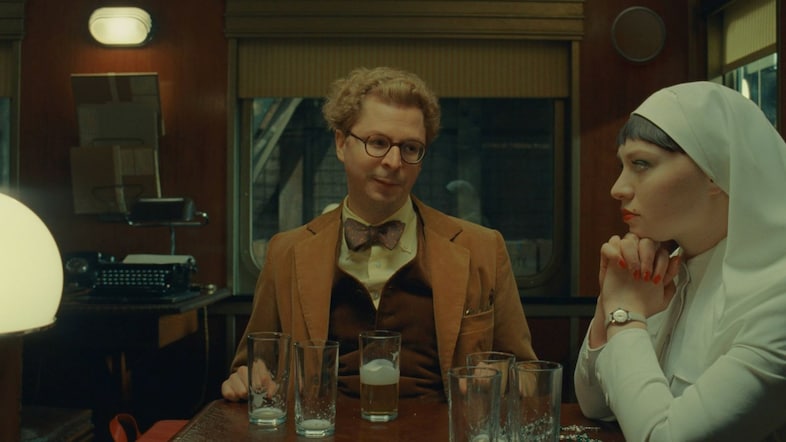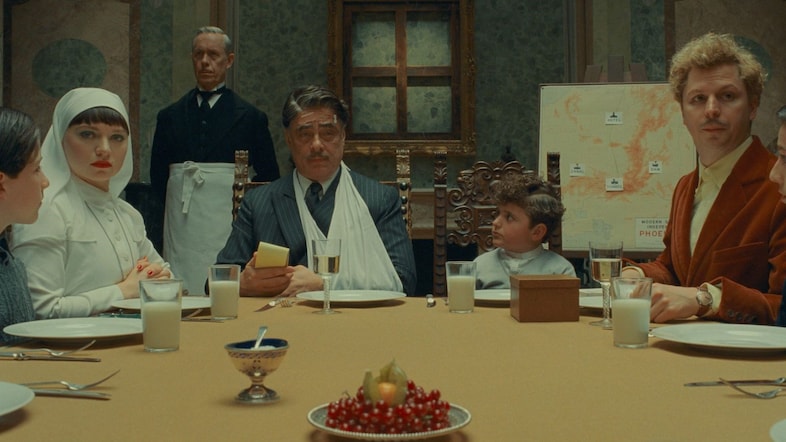The Canadian actor talks about working with the meticulous director on The Phoenician Scheme, and why people often mistake his irony for him being an “asshole”
Right before getting his break in the movies, Michael Cera was invited onto the set of Knocked Up. The 17-year-old star of Arrested Development had just auditioned for a lead role in what would become the era’s defining teen comedy, Superbad, and the film’s producer, Judd Apatow, had an idea for something fun they could do on the set of his own movie. When Cera arrived at the studio with his mum, Apatow took him to one side and told him his idea: Cera would act in a scene as Seth Rogen’s character, on a date with his Knocked Up co-star Katherine Heigl. Apatow would tell him repeatedly to up the energy in his performance, and Cera would finally lose his shit at the director, causing Apatow to ‘fire’ him. All of this would be included as a mockumentary-style extra on the DVD edition of the film.
“It was an interesting situation, because I didn’t know I’d been cast in Superbad yet,” says Cera. “But I was like, ‘OK, I’m game,’ because I was happy they were asking me and [it felt like] I was joining the club a little bit.” Finally, when the time came to do the bit, Cera’s mum couldn’t believe what she was seeing. “She thought it was all real! She was sitting there going, ‘Oh my God, he’s finally snapped. He’s ruining everything; he’s not going to do the movie,’ you know? She was moments away from running in and grabbing me.”
The clip enjoyed a second life online where the joke got lost in cyberspace, leading many to believe Cera was that asshole. (You can watch it here – look out for the startled extra at the end, when Apatow smashes a glass on the floor.) Perhaps the possibility was too delicious not to entertain: in breakout roles like Superbad, Juno and Arrested Development, Cera perfected the art of being the most awkward person in the room, a self-effacing nice guy with a perpetual note of mild panic rising in his voice.
There are no tantrums today when I meet Cera after the UK premiere of his new film with Wes Anderson, The Phoenician Scheme. “Hi, I’m Michael. Would you like a biscuit?” he says, getting up from his chair and gesturing at a plate on the table with one solitary biscuit on it. “I’m good, thanks,” I reply. “OK. That’s just gonna be there the whole time in case you change your mind.”
Cera’s been keeping busy these past few years, with supporting roles in Barbie, Dream Scenario and Gloria Bell, to name just a few. But it’s been a while since we’ve seen him in full comic flow, and, happily, The Phoenician Scheme allows him the opportunity to do just that. It’s Anderson’s funniest film in a minute, a genial, globe-trotting caper about shady tycoon Zsa-Zsa Korda (Benicio Del Toro), who hands over his fortune to his daughter (Mia Threapleton), a trainee nun called Liesl, on the proviso that she accompany him on a mission to secure funding for his legacy project. In tow is Cera, as a Norwegian taxonomy teacher called Bjørn, promoted by Korda to business affairs manager after his last assistant is blown in half by a bomb.

If it comes as a shock to realise Cera has never been in an Anderson movie until this point; we can at least say it’s been worth the wait. The Canadian actor slots seamlessly into the director’s world, stealing practically every scene he’s in with an outrageously vowel-mangling turn he says was inspired in part by Kenneth Mars’ turn in What’s Up Doc?. Asking some Norwegian friends to recite his lines in the film so he could study and record them, he then “tried to make it more musical and playful than would be natural, and just hoped that the people of Norway would not take offence at my efforts”.
Cera’s first brush with Anderson’s work came with The Royal Tenenbaums, which he experienced as a “revelation” at a cinema in Quebec. (He’d have been 12 when it came out.) “I would have killed to get into his little world at any point, so I was very thrilled to be asked,” says the actor of his role in the movie. He describes his experience on the other end of Wes’s camera as a “choreography”: “It’s like a dance happening between people, and it takes a bit of refining until everything really coalesces and finds itself. But it’s beautiful to be a part of.”
Anderson’s master-watchmaker precision extends into every area of the shoot, from the famously symmetrical blocking – “you might be in the upper-left 10% of the frame and if you don’t hold yourself perfectly erect, the shot will lose its harmony” – to the dialogue, which is virtually unchanged from what’s on the page. “Benicio said it really well, he was like, ‘The words really matter. It’s important to stick with him, not because Wes says so, but because the dialogue itself says so,’” says Cera. “The merit is evident. It’s like if you take a word out, even just accidentally, if you forget a word in the flow of a sentence, it just doesn’t pop and you’re like, ‘Why isn’t this good?’ Then you put the word back in, and it’s like, it’s just got the right kind of metre to it.”

Cera’s job, as he sees it, is to “bring something human or even a little bit disruptive within that style”, a take that brings us to an oft-cited critique of Anderson’s filmmaking style: that it lacks heart. “I think people sometimes miss that [about his films],” says Cera. “All of Wes’s movies, I think, can be boiled down at a character level to a very big love between two or more characters that is expressed in all kinds of ways.” In this one it’s Liesl and Zsa-Zsa, a terrible dad who “knows on a cellular level he’s done wrong, and something tells him to bring her to him”.
“I think a lot of people see some of the things that I’ve done [on screen] and freak out,” says Cera. “This is something you learn. You think that irony or satire is clear, but I’ve found that more than 50% of people take things at face value and think it was really me being an asshole.” At which point it’s time to go, but not before Cera kindly agrees to give a brief video message for a colleague who’s a huge fan of his work. “It was nice meeting you,” says Cera, as I make to leave. “Take care.” On the table, the biscuit remains uneaten.
The Phoenician Scheme is out in UK cinemas now.
